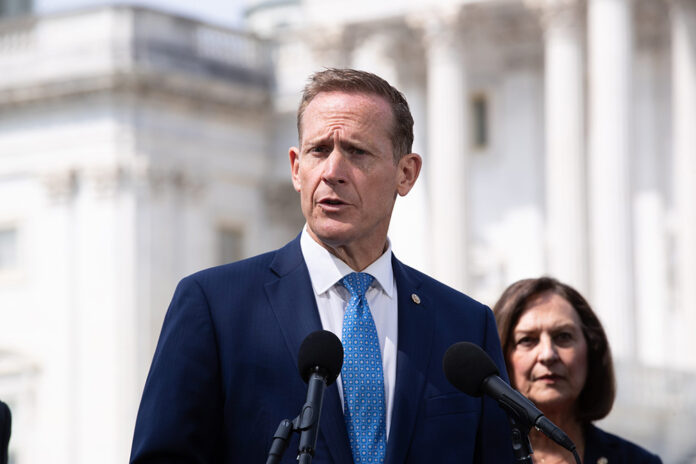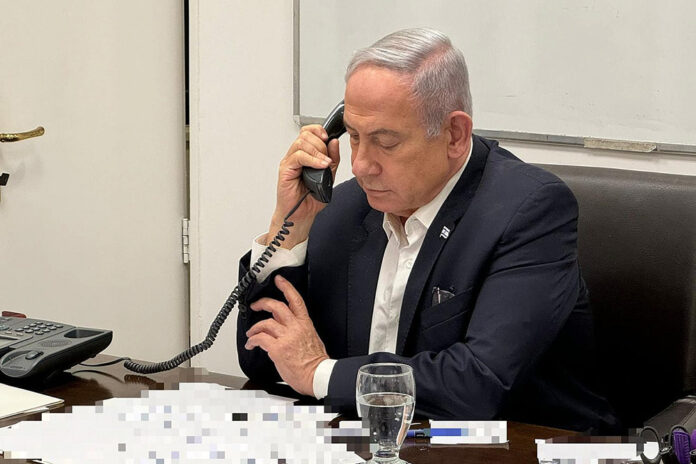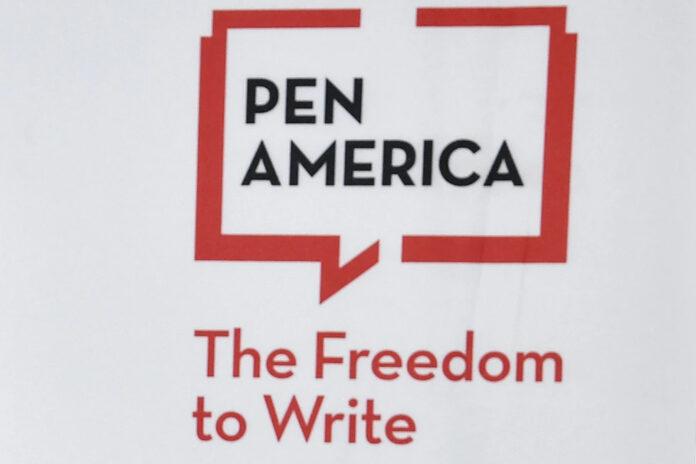Edited by: Fern Sidman
Senators Ted Budd (R-NC), Joni Ernst (R-IA), and Rick Scott (R-FL) have initiated legislation that targets Qatar’s designation as a major non-NATO ally of the United States. According to a report on Wednesday on the JewishInsider.com web site, the legislative push emerges from concerns over Qatar’s financial connections to terrorist groups, specifically Hamas, and its inaction in using its influence to secure the release of the remaining 133 Israeli hostages being held in captivity in Gaza by the Iranian backed terror group.
The senators’ legislation seeks to leverage Qatar’s status as a major non-NATO ally, a designation that brings various military and economic benefits, as a bargaining chip to force the Gulf nation to sever its ties with Hamas and take a more active stance against global terrorism. As was reported on the JewishInsider.com web site, the proposed law mandates a 90-day period within which the State Department must assess the U.S.-Qatar relationship, determining whether it aligns with U.S. national interests and whether Qatar has used its influence over Hamas effectively.
The legislation outlines specific criteria that Qatar must meet to retain its status. These include demonstrating an active effort to use its leverage over Hamas, ceasing support (both direct and indirect) to terrorist organizations, and either expelling or extraditing members of Hamas, as per the information provided in the JewishInsider.com report. Failure to meet these criteria would result in the immediate termination of Qatar’s status as a major non-NATO ally, a condition that would remain until the Gulf nation complies with all the stipulated requirements.
A point of contention highlighted in the bill is Qatar’s undermining of negotiations for a hostage deal. JewishInsider.com also reported that the senators have accused Qatar of making public calls for a cease-fire that does not condition on the release of the hostages and of claiming a lack of leverage over Hamas, actions that the U.S. lawmakers see as contradictory and harmful to efforts in securing the release of U.S. nationals held hostage.
This legislation represents a significant escalation in the scrutiny of Qatar’s foreign relations, particularly concerning its financial and material support for Hamas.
The discussion of revoking Qatar’s status as a major non-NATO ally (MNNA) by U.S. lawmakers calls attention to the dynamic and conditional nature of international relations, particularly in the context of geopolitical and security interests. The MNNA status is a significant designation by the United States, providing various military and financial advantages, such as cooperative defense research, shared military training, and priority delivery of defense material, according to the information contained in the JewishInsider.com report. However, this status is not just an honor but also a statement of trust and mutual interest, implying that the recipient country aligns with the U.S. on crucial international policies, including counterterrorism.
The controversy around Qatar’s MNNA status primarily revolves around its interactions with Hamas, an organization designated as a terrorist group by the United States. The U.S. perceives Qatar’s actions, or lack thereof, against Hamas as not just a passive stance but as support for the group, which is inconsistent with the responsibilities and expectations attached to being an MNNA.
Representative Budd’s proposal to reconsider Qatar’s MNNA status is a manifestation of broader concerns among some U.S. lawmakers about Qatar’s international conduct, especially regarding its relationship with Hamas.
In a speech on the Senate floor, Senator Budd stated, “Seeking the release of the hostages demands strength and moral clarity. We demand it of our own leaders, and we should require it from our major allies. He continued: “The State of Qatar hosts Hamas’ leaders in their capital of Doha. Now initially, Qatari officials claimed they are exercising leverage on Hamas. Then they publicly stated thereafter that they have no leverage. And now, they’re promoting a ceasefire regardless of the release of the hostages. The truth is that Qatar does have significant leverage over Hamas. They have the ability to expel these terrorists if they don’t release the hostages or at least engage in reasonable negotiations.”
He added that, “The truth is that Hamas is not interested in releasing the hostages, and Qatar seems equally uninterested in forcing them to do so. It is time that we hold nations like Qatar accountable for their dithering and their stalling. I do not introduce this bill lightly. It is not where I started with this relationship, but it is a reflection of where we are today as a result of the repeated warnings that Members of Congress have given to Qatar about the liability of continuing to host Hamas.”
Budd emphasized that, “The time for talking is over, and the time for action is now. If we don’t see action, then Qatar must face consequences. At the end of the day, this bill represents another step towards securing the freedom of our fellow Americans.”
His statement reflects a serious consideration of the bilateral relationship dynamics, emphasizing that such a privileged status requires continuous evaluation and must be merited through actions that align with U.S. interests and security imperatives.
Senator Joni Ernst’s comments further amplify the sentiment of disappointment or dissatisfaction with Qatar’s stance, indicating a broader spectrum of concern within the U.S. legislative body about whether Qatar is meeting the expectations tied to its MNNA status, as was suggested in the JewishInsider.com report.
Ernst told the JewishInsider.com that she hasn’t seen the change in posture and attitude from Qatar she’s been looking for. “I’ve told the foreign minister this — they need to step up,” she said. “They need to make sure Hamas is getting back to the table, or get rid of them.”
Other lawmakers don’t yet seem prepared to take the step laid out in the bill.
Sen. Chris Coons (D-DE), who signed a joint statement with Budd, Ernst and other colleagues last month saying that Qatar should expel Hamas leadership if negotiations fail, indicated he found the bill premature.
Coons indicated that he had personally engaged with Qatari officials, including the ambassador and foreign minister, urging them to do more to pressure Hamas towards constructive negotiations. The JewishInsider.com reported that he acknowledged the ongoing efforts by President Biden, to apply diplomatic pressure on Qatar and Hamas. However, he cautioned against immediately revoking Qatar’s major non-NATO ally status, suggesting that such a drastic measure should be considered only if Qatar unequivocally fails to take substantive action.
Senator Roger Wicker, the ranking member of the Senate Armed Services Committee, also expressed reservations about the proposed bill, emphasizing the importance of cautious deliberation. According to the JewishInsider.com, Wicker, a Republican from Mississippi, highlighted Qatar’s historical cooperation with the United States and underscored the mutual benefits derived from their bilateral relationship. He stressed the need for governments to engage in direct dialogue rather than resorting to legislative measures.
Similarly, Senator Roger Marshall, a Republican from Kansas, echoed Wicker’s sentiments, stating that he has not seen sufficient evidence to justify Qatar losing its status as a major non-NATO ally, the report added. Marshall’s remarks suggest a reluctance among some lawmakers to endorse measures that could potentially strain diplomatic ties with Qatar.
Defense Secretary Lloyd Austin also weighed in on the matter during a recent congressional hearing, commending Qatar for its efforts in facilitating hostage releases. As per the JewishInsider.com report, Austin acknowledged Qatar’s role as a key mediator in hostage negotiations and reiterated the country’s commitment to resolving such matters swiftly.

